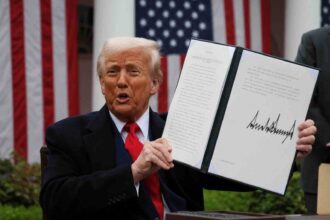The Trump administration has formally requested the Supreme Court’s approval to resume deportations of Venezuelan migrants under an 18th-century wartime law.
The emergency appeal comes after a federal appellate court in Washington rejected the administration’s plea to lift a temporary block on the deportations.
The case revolves around the Alien Enemies Act, a rarely used law invoked by President Donald Trump. He argued that Venezuelan migrants were part of the Tren de Aragua gang, which he labeled an “invading force.” The administration insists that deporting them is a matter of national security.
U.S. District Judge James E. Boasberg issued an order preventing the deportations, citing concerns about due process. His ruling emphasized that migrants should be given the opportunity to challenge their designations as gang members before removal. The government, however, has resisted this, invoking “state secrets privilege” to withhold information about deportation proceedings.
A panel of appellate judges upheld Boasberg’s ruling in a 2-1 decision. The Justice Department argued that courts should not interfere in sensitive diplomatic negotiations and that migrants should contest their cases in Texas, where they are being detained.
The American Civil Liberties Union (ACLU) filed a lawsuit on behalf of five Venezuelan migrants shortly after Trump’s proclamation was issued. The group contends that the administration is unlawfully deporting individuals without allowing them to defend themselves in court. The Supreme Court has given the ACLU until Tuesday to respond to the government’s emergency appeal.
The ruling has fueled tensions between the White House and the judiciary. Trump and his allies have called for Boasberg’s impeachment, accusing him of overstepping his authority. However, Chief Justice John Roberts has defended the judiciary, stating that impeachment should not be used as a response to judicial disagreements.
If the Supreme Court rules in favor of the administration, it could set a precedent for the expanded use of the Alien Enemies Act. Opponents argue that it would undermine legal protections for noncitizens, allowing deportations without due process.
With the case now before the highest court, its outcome could have lasting effects on U.S. immigration policy and the limits of presidential authority.
Follow us on WhatsApp | X (Twitter) | Facebook | Telegram | Pinterest | TikTok | YouTube | Google News for real-time updates!








